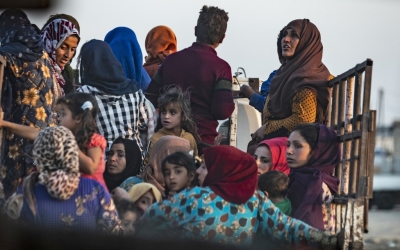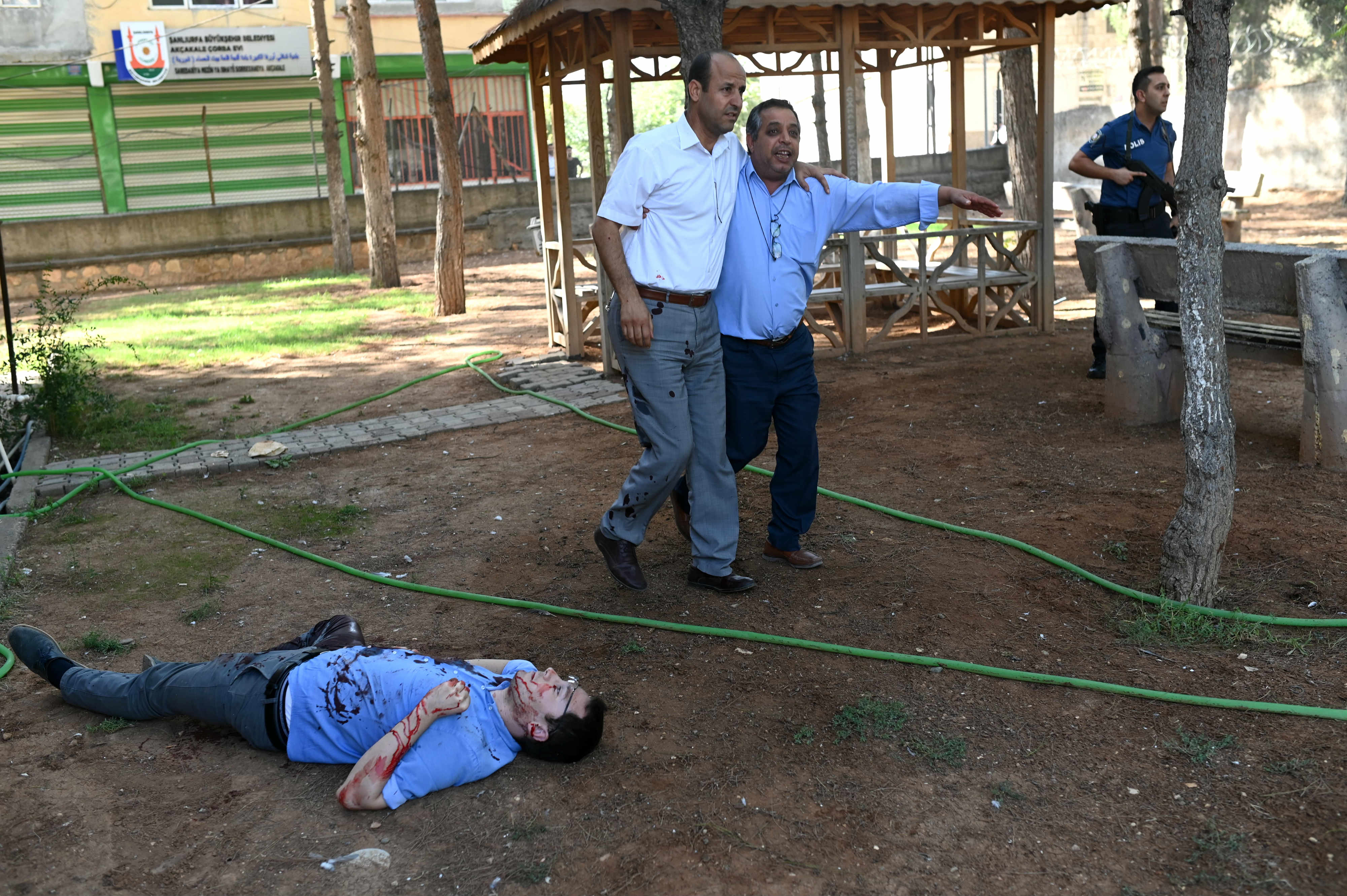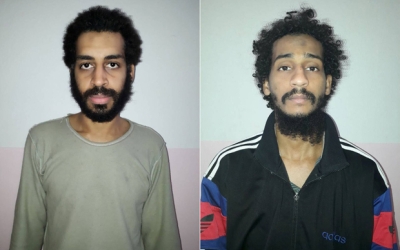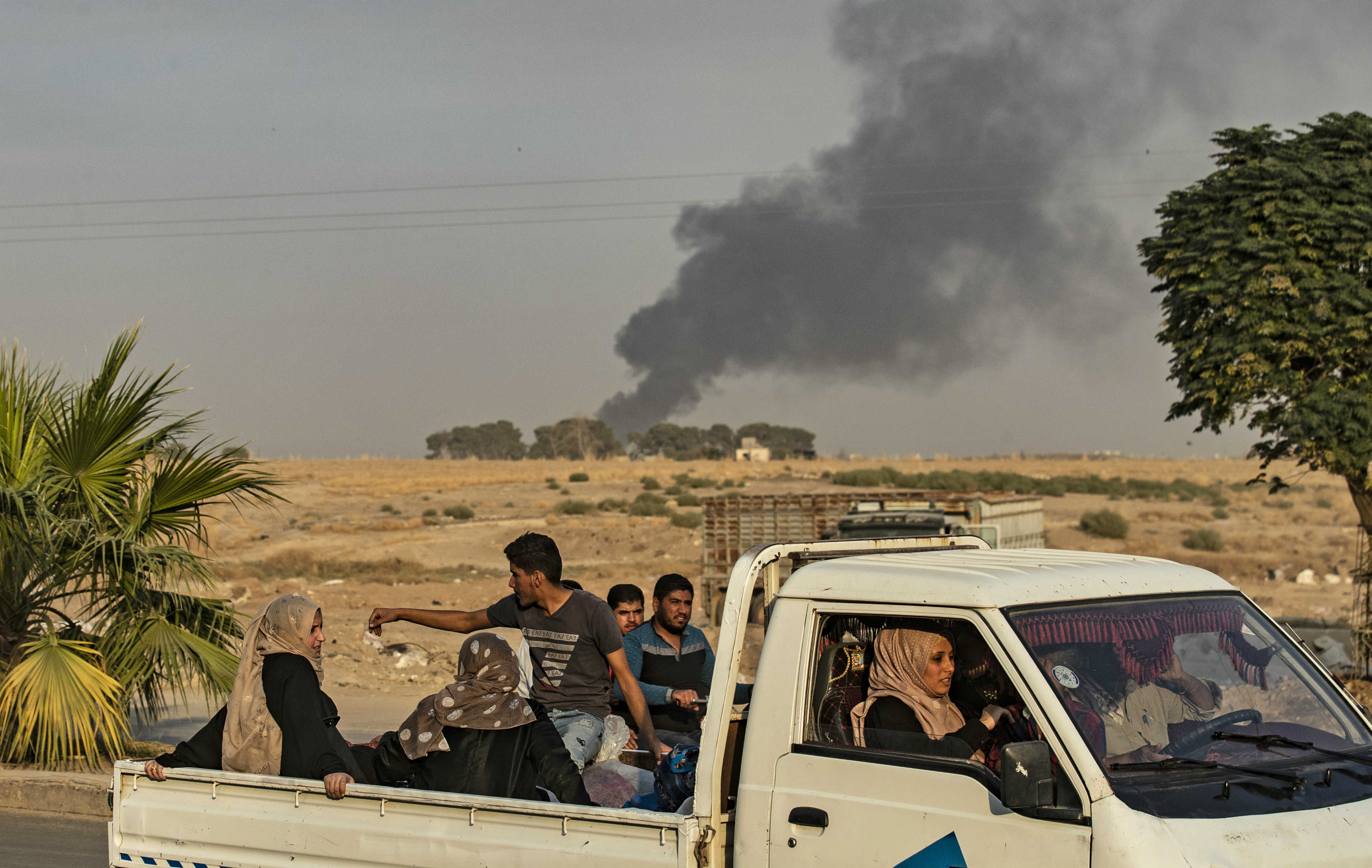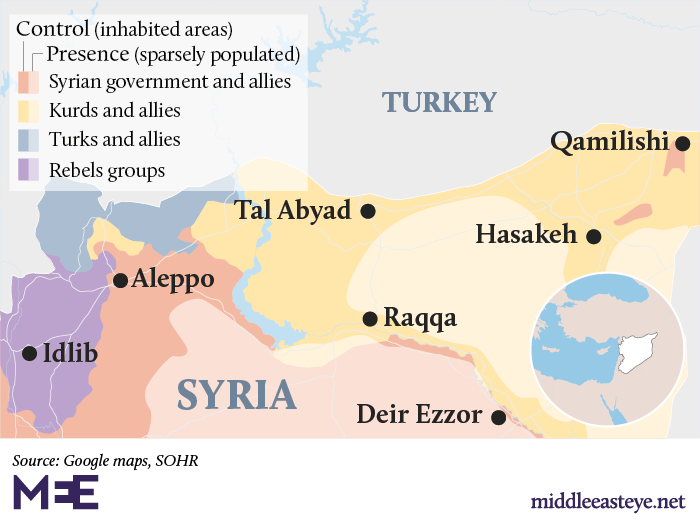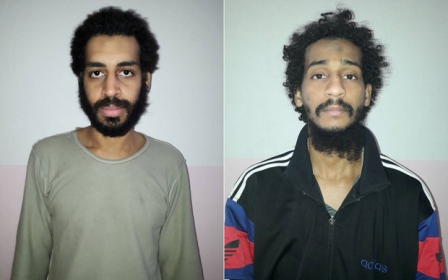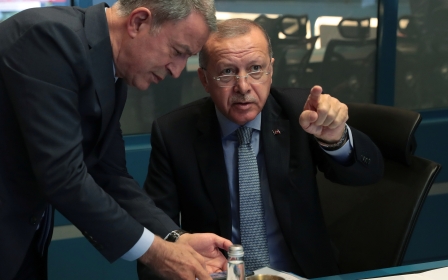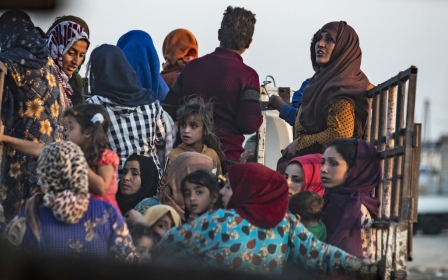Turkish forces push deeper into Syria as SDF reports heavy clashes
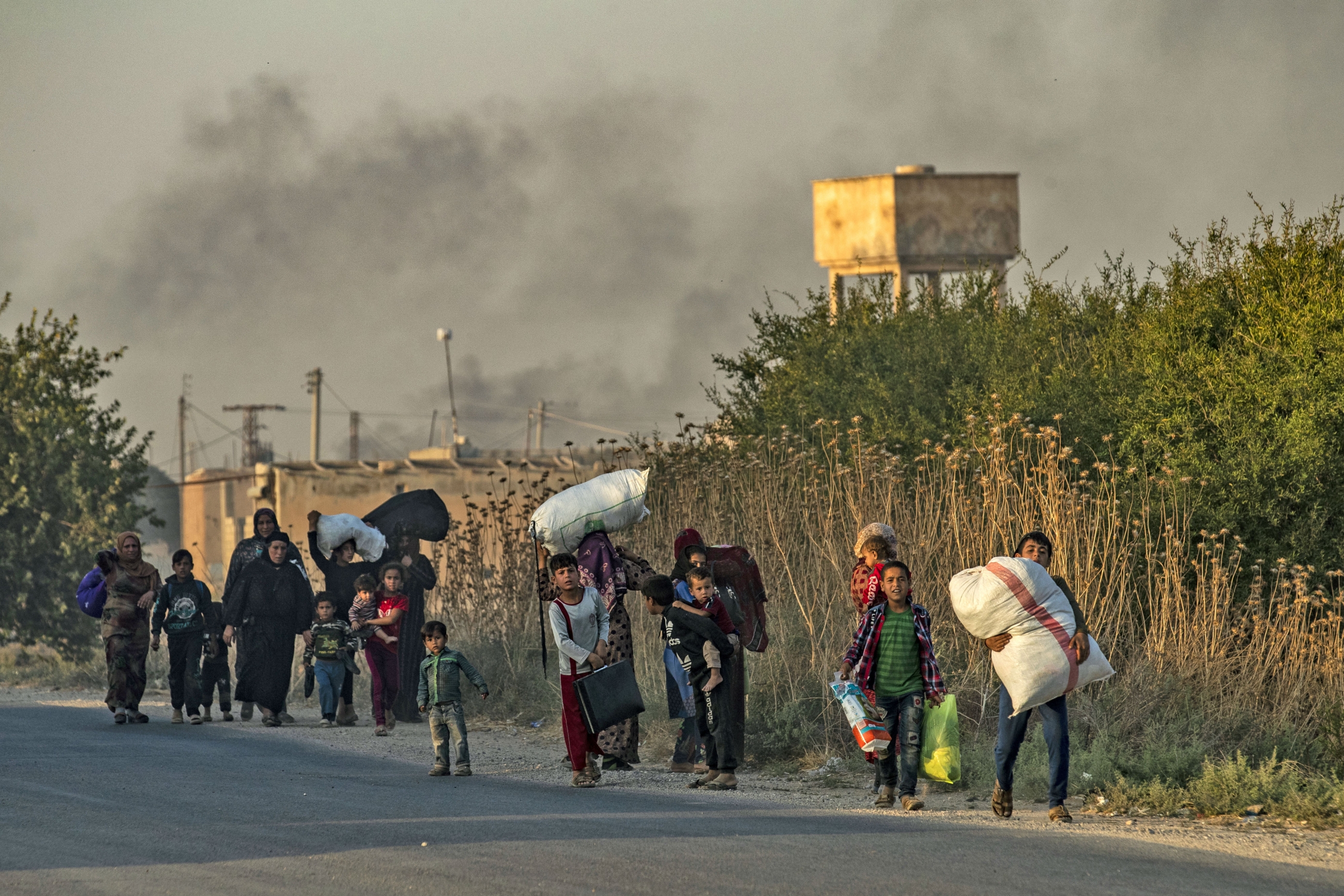
Bombs rained down on Turkish border towns on Thursday, killing three, as Turkey's military pushed deeper into Syrian territory east of the Euphrates River.
After Turkish air strikes and artillery pounded Syrian Kurdish targets overnight and in the morning, rockets and mortar bombs were fired across the border in reply.
The shelling hit sites in the Turkish towns of Birecik, Ceylanpinar and Nusaybin, as well as other locations. In the town of Akcakale, three civilians, including a baby, were killed by Syrian Kurdish fire.
Turkey's offensive, which President Recep Tayyip Erdogan launched on Wednesday after the US announced it was pulling troops from the area, has caused panic in northeastern Syria and sent tens of thousands of civilians fleeing.
On the other side of the border, people fled Turkish towns as bombs struck, with at least 46 wounded in the shelling, according to a local governor's office.
New MEE newsletter: Jerusalem Dispatch
Sign up to get the latest insights and analysis on Israel-Palestine, alongside Turkey Unpacked and other MEE newsletters
Heavy clashes between Turkish troops and the Kurdish-led Syrian Democratic Forces (SDF) militia have been reported in villages along the border.
At least 23 SDF fighters and eight civilians, two of them SDF administrators, have been killed in the fighting, the Syrian Observatory for Human Rights (SOHR), a UK-based activist group said.
The SDF has not given a casualty toll, while six fighters with Turkey-backed rebel groups have also been killed.
Erdogan told members of his AK Party in Ankara that 109 "militants" had been killed so far in the two days of fighting.
US President Donald Trump, who has been blamed for giving a green light to Turkey to invade, said on Thursday he was talking to "both sides" and warned Ankara that it would be hit hard financially if it did not "play by the rules".
"I am trying to end the ENDLESS WARS. Talking to both sides," he said on Twitter. "I say hit Turkey very hard financially & with sanctions if they don’t play by the rules! I am watching closely."
'Safe zone'
NATO member Turkey has said it intends to create a "safe zone" in order to return millions of refugees to Syria.
But world powers fear the Turkish action could exacerbate the conflict, and run the risk of Islamic State (IS) group prisoners escaping from camps amid the chaos.
"Our heroic commandos taking part in Operation Peace Spring are continuing to advance east of the Euphrates," the defence ministry wrote on Twitter on Thursday, posting a video showing soldiers firing rifles in darkness as they advanced.
The ministry said Turkish forces had seized designated targets and the operation had continued throughout the night by land and air.
The Turkish military has hit 181 Kurdish militia targets with its air force and artillery since the start of the operation into northeast Syria, the defence ministry said.
Troops entered Syria at four points, two of them close to Tal Abyad and two close to Ras al-Ain further east, according to Turkish media reports.
A witness in Akcakale said volleys of rockets were fired from there across the border into Syria's Tal Abyad.
Smoke rose from two targets hit on the Syrian side of the border, he told Reuters.
SDF spokesperson Mustafa Bali said on Twitter that the group's fighters had repelled a ground attack by Turkish troops in Tal Abyad.
Turkey-backed Syrian rebel fighters were heading to the battlefronts to support Turkish troops, a spokesman for the rebels said on Thursday.
Fighters from the opposition Syrian National Army are moving towards Tal Abyad and Ras al-Ain, Major Youssef Hamoud said.
Hamoud denied the SDF reports that clashes were raging between the Turkish army and SDF forces on the outskirts of Tal Abyad.
'We will not leave this land'
According to the SOHR, more than 60,000 people have fled since the offensive began, adding that most of the displaced travelled east towards the city of Hasakeh.
The towns of Ras al-Ain and Darbasiyah, some 60km to the east, have been largely deserted as a result of the attack.
Turkish forces shelled Ras al-Ain with SDF fighters responding in kind.
Why is Turkey invading northeast Syria?
+ Show - HideWho is fighting who?
Democratic Union Party (PYD)/Peoples Protection Units (YPG)
Founded in 2003, the PYD and its military wing the YPG are the ideological sister group of the Kurdistan Workers Party (PKK), which has fought a decades-long conflict with Turkey.
Following the beginning of the Syrian civil war in 2011, the PYD managed to take control of much of the Syria's north in the security vacuum that followed.
The group claims to espouse an ideology called "democratic confederalism", based on the ideology of PKK founder and leader Abdullah Ocalan, who has been in prison in Turkey since 1999.
Turkey
Turkey has long viewed the growth of the PYD with deep concern, and a peace process between Turkey and the PKK collapsed in 2015 in part over the spread of the Syrian Kurds' influence.
Since then, Erdogan has repeated his determination that he would "never allow the establishment of a Kurdish state in northern Syria".
What does Turkey want in northern Syria?
Turkey fears that a pro-PKK entity on its southern border would inevitably become a launchpad for attacks on Turkey.
In addition, Turkey wants to expell Syrian refugees from Turkey and resettle them in a "safe zone" it plans to create in northern Syria.
Turkey has the largest refugee population in the world, and the presence of Syrians in the country has increasingly led to animosity from Turks who blame them for crime, unemployment and the dilution of Turkish culture.
What does the PYD want in northern Syria?
The PYD's long-stated aim has been the creation of a statelet on the basis of Ocalan's ideology, as well as protecting Kurdish rights.
The area controlled by the PYD, known as Rojava, has established autonomy with networks of local councils and forums that aim to promote decentralised democracy - though the group has been accused of enforcing a one-party rule in the region.
What does the US-led coalition want?
Donald Trump was elected on a platform of isolationism and has touted the defeat of IS as the sole reason for US involvement in Syria - now that has largely taken place, Trump has argued the United States has no need to remain.
The biggest fear for the US and its allies is that Turkey's takeover of PYD-controlled areas could see the release of some of the 15,000 IS fighters previously captured by the Kurds and their allies.
What does the Syrian government (and its allies) want?
The Syrian government, as well as its close allies Iran and Russia, are happy about the US' decision to withdraw from the north, but have expressed concern about the violation of Syria's sovereignty by Turkey.
Syrian President Bashar al-Assad hopes that, when faced with the threat from Turkey, the PYD will throw their lot in with him in order to avoid total defeat.
Assad has repeatedly said he aims to regain control of all of Syria, and if the PYD was to ally with him formally, it would bring the largest area hitherto out of his control back under Damascus' influence.
The town has seen checkpoints erected by Kurdish-led security forces, who have stockpiled tyres that can be set alight in an attempt to blur the vision of Turkish fighter pilots above.
Ras al-Ain is one of the towns US troops have pulled out from.
"We will not leave this land," said Kaws Seem, a 32-year-old Ras al-Ain resident.
"War has been chasing us for years, and everyday Erdogan threatens us with a new attack."
In the face of the onslaught, Kurdish authorities announced a general mobilisation, urging all civilians to "head to the border with Turkey... to resist during this delicate historical moment".
Erdogan launched the offensive on Wednesday after the United States announced it was withdrawing its troops from the area, paving the way for an assault and leaving its erstwhile allies the Kurds in disarray.
The SDF also called on the international community to impose a no-fly zone to protect against "an imminent humanitarian crisis".
IS suspects moved to US custody
The SDF holds thousands of IS fighters and tens of thousands of their relatives in detention.
One of the prisons where IS detainees are held was struck by a Turkish air strike, the SDF said on Twitter.
"The Turkish regime... targeted a section of the Jerkin prison," in the Kurdish-majority city of Qamishli in the northeast, the region's autonomous Kurdish administration said.
"The prison houses some of the most dangerous criminals from more than 60 countries, who committed all kinds of crimes when they were members of the IS group," it added.
The US military has taken around 40 leading IS figures, including two high-profile British IS suspects previously held in Syria by the SDF, into US custody and moved them out of the country to a secure location, a US official said.
Erdogan said on Thursday that he guaranteed that IS fighters will not have a presence in northeast Syria after Turkey completes its offensive.
In a speech to officials from his AK Party, the Turkish president said IS prisoners who need to be kept captive will be held in prison and those accepted by their own countries will be returned home.
A senior Kurdish official warned on Thursday that IS prisoners could break out of jails as the fighting intensifies.
Badran Jia Kurd told Reuters the number of security forces guarding the IS detainees would have to be reduced as the Turkish forces step up their offensive.
"This attack will definitely reduce and weaken the guarding system for those Daesh militants in the prisons," he said, using the Arabic acronym for IS.
"This could lead to their escape or to behaviours that may get out of the control of the security forces," added Jia Kurd, adviser to the Kurdish-led authority running much of north and east Syria.
"The number of forces guarding the prisons is reduced the more the battles intensify. This poses a grave danger."
Russia calls for dialogue
Ashamed of Washington's role in making way for the Turkish incursion, senior members of Trump's own Republican Party have condemned him for abandoning Syrian Kurds, who have been loyal allies of Washington in the fight against IS.
The United Nations Security Council will meet on Thursday to discuss Syria at the request of the five European members: Britain, France, Germany, Belgium and Poland.
In a letter to the 15-member Council seen by Reuters, Turkey said that its military operation would be "proportionate, measured and responsible".
The 22-member Arab League said it will hold an emergency meeting on Saturday.
Nato chief Jens Stoltenberg urged Turkey to show "restraint" in its operation against Kurdish forces in Syria, warning that the fight against IS should not be put at risk.
Erdogan warned the European Union on Thursday that Ankara would allow millions of refugees to head to Europe if the bloc criticised Turkey's military offensive in Syria.
"Hey EU, wake up. I say it again: if you try to frame our operation there as an invasion, our task is simple: we will open the doors and send 3.6 million migrants to you," Erdogan said in a speech to his party.
Russia plans to push for dialogue between the Syrian and Turkish governments following the incursion, the RIA news agency cited Russia's Foreign Minister Sergei Lavrov as saying on Thursday.
'They didn't help us with Normandy'
At a news conference on Wednesday, Trump defended US policy towards the Kurds, saying Washington had spent "tremendous amounts of money" arming and funding them.
"The Kurds are fighting for their land... As somebody wrote in a very powerful article today, they didn't help us in the Second World War, they didn't help us with Normandy as an example... But they were there to help us with their land, and that's a different thing," Trump said.
"With all of that being said, we like the Kurds."
US Secretary of State Mike Pompeo denied on Wednesday that the US gave Turkey a "green light" for its offensive in Syria.
Pompeo told US broadcaster PBS: "The Turks have a legitimate security concern. They have a terrorist threat to their south."
But one of Trump's closest fellow Republican allies, Senator Lindsey Graham, said failing to support the Kurds would be "the biggest mistake of his presidency" and unveiled a framework for sanctions on Turkey with Democratic Senator Chris Van Hollen.
The proposed sanctions would target the assets of senior officials, including Erdogan, mandate sanctions over Turkey's purchase of a Russian S-400 missile defence system and impose visa restrictions.
They also would sanction anyone who conducted military transactions with Turkey or supported energy production for use by its armed forces, bar US military assistance to Turkey and require a report on Erdogan's net worth and assets.
'Negative repercussions'
The YPG, a Syrian Kurdish militia that dominates the SDF, was for years Washington's main allies on the ground in Syria, and the incursion was potentially one of the biggest shifts in years in the Syrian war that has drawn in global and regional powers.
The Kurds played a leading role in capturing territory from IS, and now hold the largest swath of Syria outside of the hands of Syria President Bashar al-Assad.
The SDF say they lost 11,000 personnel in years of operations against IS that climaxed in March with a battle against the final bastion of IS's so-called caliphate in Baghouz.
Since 2015, Russia has been the main military backer of the Syrian government, which has seized on the policy shift from Trump to try to persuade the Kurds to accept the restoration of central government control.
Saudi Arabia also condemned the Turkish offensive, arguing it would have "negative repercussions on the security and stability of the region".
The Kurds have warned that a Turkish offensive would reverse the military gains achieved against IS and allow the group's surviving leaders to come out of hiding.
Middle East Eye delivers independent and unrivalled coverage and analysis of the Middle East, North Africa and beyond. To learn more about republishing this content and the associated fees, please fill out this form. More about MEE can be found here.


